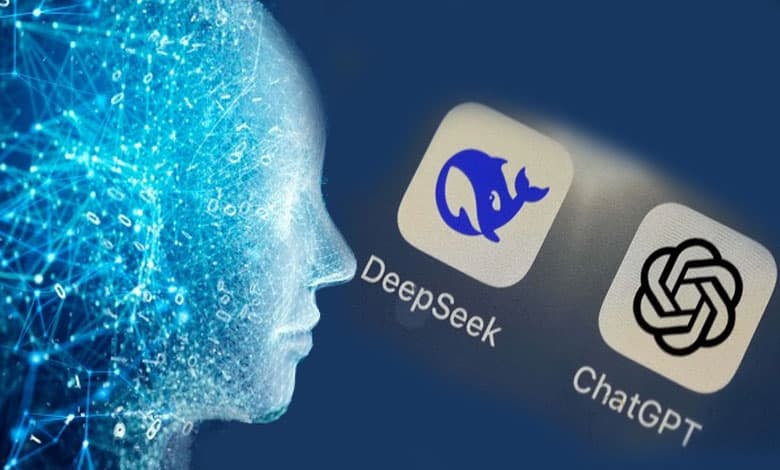ChatGPT and DeepSeek Face Ban in India? – What You Need to Know About AI Chatbot Risks
DeepSeek, the Chinese open-source AI chatbot, which took the tech world by storm last week due to its competitively priced technology, is now facing significant roadblocks

Hyderabad: DeepSeek, the Chinese open-source AI chatbot, which took the tech world by storm last week due to its competitively priced technology, is now facing significant roadblocks amid mounting security concerns from several countries.
Table of Contents
Celebrated for its significantly lower cost compared to OpenAI’s models, DeepSeek’s rise has now attracted increasing scrutiny. A growing number of nations have moved to restrict or ban the use of DeepSeek, citing fears about data confidentiality and national security risks.
India and the Ban on AI Tools
In India, the Finance Ministry has issued a directive instructing all government officials to refrain from downloading or using AI applications, including DeepSeek and ChatGPT, on office computers or devices. The ministry’s concerns stem from the potential risks these tools pose to the confidentiality of sensitive government data and documents.
A spokesperson from the Ministry highlighted that these AI technologies might compromise government operations by potentially harvesting and transmitting confidential information to external entities. This concern is shared by many governments worldwide, prompting a reevaluation of AI-driven tools.
The Department of Expenditure issued a formal note on January 29, stating that AI apps and tools like DeepSeek and ChatGPT should be strictly avoided on office devices, citing security concerns. The move comes in response to growing international unease regarding DeepSeek’s data privacy practices and its potential for misuse in governmental operations.
Growing Global Resistance: US, Australia, South Korea, and Europe
Across the world, DeepSeek is facing increasing restrictions. In the United States, several federal agencies have implemented measures to restrict employees from accessing DeepSeek due to security risks. Reports suggest that the US government is especially concerned about the potential exposure of sensitive data via this Chinese-developed AI tool.
Australia has also taken significant action by banning DeepSeek from all government systems and devices. The Secretary of the Department of Home Affairs issued a directive to prevent government entities from installing or using the chatbot, citing data security concerns. The Australian government is particularly worried that the Chinese government could access sensitive data through DeepSeek.
In South Korea, the Industry Ministry temporarily suspended access to DeepSeek, raising similar concerns over the chatbot’s data collection policies and the risks it poses to government privacy. South Korean authorities have advised ministries to carefully consider the security implications before using AI technologies like DeepSeek or ChatGPT.
Meanwhile, European countries, including France, Belgium, the Netherlands, and Ireland, have also voiced concerns over DeepSeek’s data collection practices. These countries fear that the app could share collected data with the Chinese government, heightening the risk of privacy violations and cyber threats.
The Controversial Low-Cost Technology
DeepSeek’s latest AI offering has attracted global attention for its incredibly low-cost model, priced at just USD 6 million, compared to the billions of dollars that major AI models like ChatGPT have cost to develop. Furthermore, DeepSeek’s R1 uses a fraction of the compute power required by established AI models, making it a highly efficient and cost-effective alternative.
This low-cost efficiency led DeepSeek to overtake ChatGPT as the top-ranked free app on Apple’s Appstore last week. The rapid rise of DeepSeek has left the US tech industry stunned, as they grapple with how such a competitively priced AI tool could outperform their multi-billion-dollar investments in AI technologies.
The Broader Debate on AI Security
The backlash against DeepSeek underscores the growing global debate over AI security. As AI technology continues to evolve at a rapid pace, governments around the world are being forced to balance the benefits of innovation with the need to protect their citizens’ privacy and security.
While AI holds great potential to revolutionize industries and solve complex problems, the growing concerns about data security and the risks posed by foreign-controlled technologies like DeepSeek have raised alarms. These concerns have led to heightened scrutiny of AI tools used in government systems and sensitive sectors.
Conclusion
As DeepSeek faces increasing international resistance, the Chinese startup must address these security concerns to maintain trust and viability in the global AI market. The broader conversation surrounding AI, privacy, and national security is only just beginning, with governments prioritizing the safeguarding of sensitive data over the rapid expansion of AI technologies.
For now, the future of DeepSeek hangs in the balance as it faces mounting pressure from countries wary of its potential security risks. The AI industry, as a whole, must navigate these challenges carefully to ensure that innovation does not come at the cost of privacy and national security.
